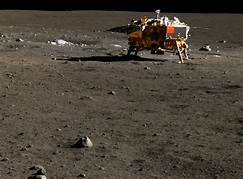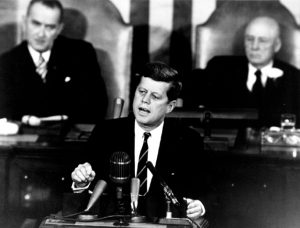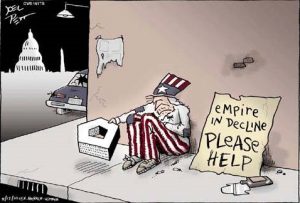Here is Part 2 of my original post on the collapse of the American Empire.
When former President Obama scrapped the U.S. Manned Space program via Presidential fiat back in 2011, he signaled to the world that the U.S. was ceding its leadership and expertise in space exploration to nations like China and India.
In one of the most arrogantly oblivious declarations, any president ever made he said he was ending the Constellation manned lunar landing program because “we’ve been there before.”
Instead of sending more Americans to the moon, he talked about possibly landing men on an asteroid in 2025 or perhaps Mars at some later date.
Our friends the Chinese were no doubt ecstatic at this announcement.
They have already embarked on a Lunar Exploration Program that will send both robots and men to the moon by 2025. In 2011, a Chinese rocket carried a boxcar-sized module into orbit, the first building block for a Chinese space station that was completed in 2020–the same year that the International Space Station, which is jointly operated by the U.S., Russia, Canada, Japan, and 11 European countries, was scheduled to be de-orbited.

In early October a Long March 3C rocket with the Chang’e-2 probe took off from Xichang launch center. The Xinhua News Agency said Chang’e-2 would circle just nine miles above the Moon’s rocky terrain in order to take photographs of possible landing locations.
It is China’s second lunar probe – the first was launched in 2007. The craft stayed in space for 16 months before being intentionally crashed onto the Moon’s surface. This year the Chinese began mapping the entire surface of the moon with orbiting vehicles and in 2012 it will land lunar rovers that will begin prospecting for strategic materials.
Chinese scientists believe the moon is loaded with base metals and something called “lunar helium-3,” considered a perfect fuel for nuclear fusion power plants.
Robert Bigelow, the founder of Bigelow Aerospace, the company he created over a decade ago to develop commercial space habitats using expandable (or inflatable) technology licensed from NASA, insists this is just the beginning of what he fears is an attempt by China to actually claim the moon as its own territory, locking out the United States and other nations.
One obvious obstacle is the Outer Space Treaty, of which China is a party. That treaty prohibits nations from making territorial claims to the Moon or other celestial bodies. Bigelow suggested, though, that China could work to amend the treaty through the support of countries in Africa and Latin America where China is making major investments and who routinely vote against the United States in international bodies such as the United Nations.
Alternatively, he said, China could simply decide to withdraw from the treaty. Public opinion, he said, won’t be a factor. “There isn’t going to be World War Three over this,” he said. “There isn’t going to be a single shot fired.”

Here is what the U.S. can expect, thanks to our myopic U.S. president: Soon, the only people walking around on the moon will be Chinese, and don’t expect them to share any significant base metal or lunar helium-3 finds. That is simply not the DNA of a hard-core Communist regime that controls China.
As Bigelow said in a recent talk to the International Symposium for Personal and Commercial Spaceflight (ISPCS) in Las Cruces, New Mexico:
“China’s quest for prestige—to demonstrate that it is the most powerful country in the world—will inevitably drive the country to lay claim to the Moon. China already has a grand national vision. Their vision is that China wants to be indisputably number one in the world, measured any way you want to measure.”
One of the biggest advantages of the Chinese system is that they have five-year plans so they can develop well ahead, said Peter Bond, consultant editor for Jane’s Space Systems and Industry.
“They are taking a step-by-step approach, taking their time and gradually improving their capabilities,” Bond said. “They are putting all the pieces together for a very capable, advanced space industry.”
Meanwhile, NASA closed out its 30-year space shuttle era in 2012, leaving the U.S. dependent on hitching rides to the space station aboard Russian Soyuz capsules at a cost of $56 million per passenger, rising to $63 million or more today. The U.S. also hopes private companies will develop spacecraft to ferry cargo and crew to the space station.
China is not the only country aiming high in space. Russia has talked about building a base on the moon and a possible mission to Mars but hasn’t set a time frame. India, which has already achieved an unmanned orbit of the moon, is planning its first manned space flight in 2016.
To be sure, space exploration is expensive. But to intentionally abandon leadership in an area where the U.S. has been a leader is simply misguided.
When President Kennedy announced in 1961 that the U.S. would land a man on the moon by the end of the decade because “we choose to,” it was a statement dripping with optimism that instilled pride and confidence in the American people.
His words seem as relevant today as when President Kennedy spoke them 56 years ago. Take a look at this excerpt:

“We set sail on this new sea because there is new knowledge to be gained, and new rights to be won, and they must be won and used for the progress of all people. For space science, like nuclear science and all technology has no conscience of its own. Whether it will become a force for good or ill depends on man, and only if the United States occupies a position of pre-eminence can we help decide whether this new ocean will be a sea of peace or a new terrifying theater of war.
We choose to go to the Moon! We choose to go to the Moon in this decade and do the other things, not because they are easy, but because they are hard; because that goal will serve to organize and measure the best of our energies and skills, because that challenge is one that we are willing to accept, one we are unwilling to postpone, and one we intend to win.
Fifty years later Obama chose to eliminate manned flights to the moon and concede lunar exploration to the Chinese. Not a move that instills pride and confidence, let alone optimism.
While the investment in space exploration alone does not signal the end of the American Empire, the fact that we are abandoning it says a lot about American leadership—or the lack thereof.
What made the American Empire remarkable was its refusal to accept defeat, to take a back seat amongst nations, to merely observe history instead of making it.
It is easy not to do something because it is difficult or expensive, but effective leadership requires that we not give up no matter how difficult or what the cost
If we do, then the American Empire is destined for the ash heap of history just as Rome and countless other empires were.
I hope I’m not around to see it.


